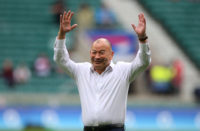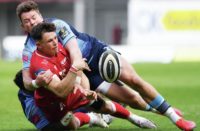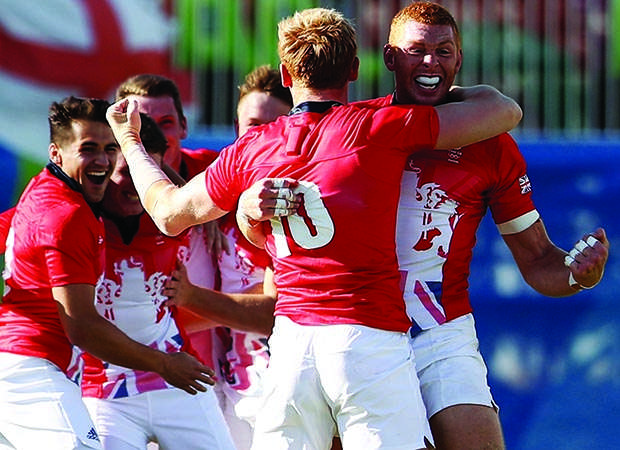 Team GB’s Sevens men confounded all odds to win silver at the Olympics. Head coach Simon Amor, below, now back in charge of England Sevens, relives those magical days and tells NEALE HARVEY why he is ready for another crack.
Team GB’s Sevens men confounded all odds to win silver at the Olympics. Head coach Simon Amor, below, now back in charge of England Sevens, relives those magical days and tells NEALE HARVEY why he is ready for another crack.
So how was the Olympics experience?
It was the most special time anyone’s been involved with. Everybody really embraced the Team GB feel and going to the Belo Horizonte holding camp and seeing our players mix with world-class athletes from other sports, then heading into the village in Rio, I can’t quite put it all into words. Put it this way, it justified what a unique experience the Olympics is.
What sort of people were you mixing with?
Initially in Belo Horizonte it was the swimmers and archers, but then the athletes turned up – your Adam Gemilis of the world. Then once you got to Rio the BOA were big on the ‘one team’ philosophy and we got to mix with all the cyclists and guys like Andy Murray and Justin Rose. All those world-class athletes were incredibly down-to-earth and our guys lapped it up.
Did all that give your team an extra boost?
Beforehand, people like Stuart Pearce and Denise Lewis told us to embrace Team GB and feed off that. Chris Hoy did our shirt presentation and spoke amazingly as well, so we really tried to make all that happen and it worked. We were hoping it was going to be big and it was, so one of the reasons behind the guys’ success is that we got fully stuck into it.
Be honest, 12 months ago did you feel you’d taken on an impossible job?
I knew it was going to be a tough one and knew the constraints, but I thought, ‘Simon, it’s the Olympics, if you don’t give it a shot you’ll probably regret it for the rest of your life’. What that meant was I was very comfortable leading from the front and while everyone said it was a 10-week programme, in actual fact it started 12 months ago when we started to instil the Team GB message. In practical terms, that meant me putting Team GB first as well, which entailed resting and rotating the England team during the World Series.
That was tough for everyone – the players didn’t like it, the fans certainly didn’t like it and neither did the coaching team – but if you’re going to put Team GB first those calls had to be made to give us the best chance.
You managed to select a few 15s players, but did you get enough assistance?
Everyone sits there and goes, ‘get the best 15s players or get the Unions to do this and that’, but it’s a really complex situation. The Scots are owned by their Union, the Welsh are half owned by theirs, while the English are owned by the clubs. The World Series clashes with the Six Nations, which is a big issue moving forward, and there are June Tests as well, so trying to get those guys made available has to fit with what the 15s coaches are doing. Given the complexities and this being the first time Sevens has been at the Olympics, I was pleased with the guys I had.
There were selection criteria and we reviewed tons of footage, but the ones we eventually got all had past Sevens experience so they weren’t fish out of water. They managed to make the adaption and I was delighted.
How close would Joe Simpson have been without injury?
Joe’s an unbelievably talented player and he was so unlucky, but even Mark Bennett and James Davies found the transition really difficult physically and in terms of game understanding. They came through at the end and Joe may have as well, but that’s hypothetical.
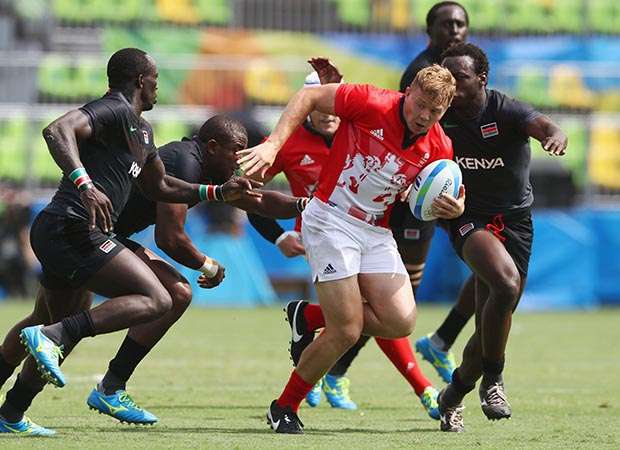 How agonising was your final selection process?
How agonising was your final selection process?
Brutal. We had 27 guys involved from the start and you could probably have selected 20. Some of the guys left out were world-class players. There were huge emotions and it was very hard to leave out guys like Luke Treharne, Scott Riddell and Cory Allen, but you had to go with combinations you thought would work against teams like New Zealand and South Africa.
Did you really believe you had a medal shot?
There was unbelievable self-belief amongst the group. We knew people didn’t think we had a realistic shot and knew it was going to be an uphill battle, but we had talent and an unbelievable Team GB spirit. The guys did well to beat Kenya first-up and our combinations clicked, so we drew momentum from that, played well against New Zealand and hung in there. I’ve never been involved in a group of players that fought so much and just would not give up. You can talk about tactics and technique but to see their heart and belief in each other was extraordinary.
Was the astonishing 5-0 quarter-final win over Argentina a defining game, not just for Team GB but Olympics Sevens in general?
One of the things we talked about was being brave – and that was one of the bravest performances by a team I’ve been involved in. We were foolishly brave at times but they just wouldn’t give up and Dan Bibby’s winning try in extra-time was definitely a defining moment. The most satisfying thing about it, though, and what everyone around the world saw, was the extraordinary sportsmanship between the players at the end. Argentina were devastated, but the way our guys consoled them was genuine and that was such a big showcase for our sport. Equally satisfying, though, was the way our boys then picked themselves up the following day to pull off another epic 7-5 victory over South Africa to reach the final and guarantee a medal.
You probably did well to get as far as you did?
Physically it was hard but Dan Howells, our S&C man, is the best in the business and the way he managed to peak everyone for the tournament was amazing. He is world-class and we were the only team to come out of the Olympics with no injuries.
Sounds harsh, but is the 43-7 final defeat to Fiji one you’d rather forget?
We were disappointed with the result but it was probably a game too far. Look, we’d been to the well four times against Japan, who finished fourth, New Zealand (fifth), Argentina (sixth), South Africa (third) and then ended up playing Fiji, who were champions. We were runners-up but, deep down, when Fiji are in that form you know you’re in for a hard day. Ultimately, it was probably right for a country that had never won anything in an Olympics before, and who play the game of Sevens in such an exciting way, to get that gold medal.
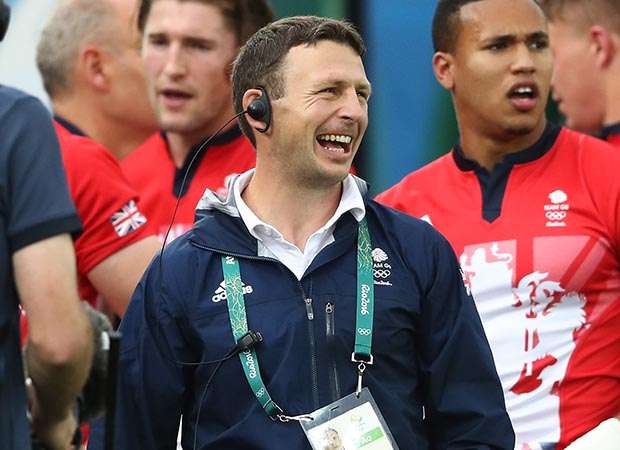 What did you say to Fiji coach Ben Ryan?
What did you say to Fiji coach Ben Ryan?
We see each other all the time and he’s done a fantastic thing in winning two World Series’ and an Olympics gold medal. I’m pleased for him and they’ve done a great job because expectations around Fiji were so high. I just congratulated him and wished him the best for the future.
What sort of a future do you think Ben has?
I don’t talk about other coaches. What I loved about the Olympics was how a lot of the focus was on the players as role models for aspiring kids. Kids don’t look up and say they want to be the next coach, they want to be the next Tom Mitchell, Dan Norton or James Rodwell – at least my kids do! It was amazing to see them get all that publicity.
Are you worried about your England guys being picked off by 15s?
It’s one of the challenges we face in the England programme. It’s wonderful seeing guys like Marcus Watson, Mike Ellery and Jeff Williams progressing to Newcastle, Saracens and Bath but it’s not easy replacing them. Our players know the situation and if they want to explore another opportunity and feel it’s the right one we’ll support it, but I’m pretty hopeful that with all the excitement around Sevens and what lies ahead, they’ll stick around on the circuit. They love representing their country and what they do and they’re proud of what they’ve achieved.
Won’t their market value have shot up, though?
Certainly, that’s the way the Premiership is going and that may be a challenge for us going forward. If it comes, we’ll just have to deal with it.
What plans do you have for England Sevens now?
Hopefully, most of our senior guys will go again but because of how we structured things last season, with rotating the squad, we managed to blood a few youngsters like Cam Cowell, Ethan Waddleton,
Ruaridh McConnochie and Oscar Hirskyji-Douglas, so we’ve got a few guys to come in. Then, with the Premiership academy programme getting stronger, we work very closely with the academy managers to find out which players they are releasing.
We had a talent ID day back in April with 20-odd guys there and of those we’ve identified seven who will train with the boys full whack this season. We’re starting that pathway early so that when the next Marcus Watson or Alex Gray leaves our programme we’ve got the next person ready to come in.
Any ambitions to return to 15s yourself?
No. England’s an amazing job and I’m excited to be getting back to a World Series without having to rest and rotate players. We can give it our best shot, which will please the players!
Would you take on Team GB again?
So long as the people above me and the players think I’m doing a good job, and it fits in with the family and I’m enjoying it, then, yes. It’s a tough job but it’s an amazing job, so much fun.
Has Sevens done enough to remain an Olympics sport beyond Tokyo 2020?
I’d be hugely disappointed if that wasn’t the case. It’s done too much for the game now and the impact globally has been enormous. When you were in the athletes’ village you noticed how much the other athletes loved it. They were screaming at TVs because they could connect with so many facets of the game – the pace, the physical endurance, the grappling and wrestling skills – and it’s going to be fascinating to see where it goes over the next few years.
What impact will there be on the World Series?
I’d imagine most teams will press the reset button. On Olympics cycles they work on a four-year process so a few teams will try different combinations and there’ll be some coaching changes, but for Tokyo 2020 I think things will go to a whole new level. People will have learnt a lot from this cycle and be better for it, so for every team it’s going to be harder to qualify and compete.
In two years’ time you’ve got a Commonwealth Games and a Sevens World Cup, which will mean a really demanding schedule, and after that you go into an Olympics qualification year. You’ll need bigger squad sizes to cope with the demands – it will be a lot more challenging ahead of Tokyo.
Have there been any preliminary talks on how to take Team GB forward?
It’s definitely something that’s got to be looked at to give ourselves the best chance. The Unions have done a good job given the complexities of the first one and to get silver is brilliant, but other teams will get better and we have to as well. At the same time, we have to be careful not to throw knee-jerk ideas around, it’s got to be part of a whole plan going forward.
Will throwing a one-off team into a Sevens World Cup two years before the Olympics make a difference?
Probably not. In an ideal world you need Team GB to compete in the World Series to give it the best preparation for the Olympics, but how that works needs to be looked at. It’s a complicated one and you’ve got to have World Rugby and all the Unions involved. For example, the Home Unions have their own Sevens programmes so what happens to them? You can’t just shut them down. Then if you do have Team GB in the World Series, which teams come on board to make up the numbers? There are good discussions to be had.
There’s talk of an international Super Sevens series being created in America, what do you make of that?
It’s exciting. There’s loads of ventures being talked about which is great, but what is clear is the World Series is here to stay and when you see new tournaments being sold out, as they were last season, that’s exceptional. However, what World Rugby have to look at now is the scheduling because we don’t want to get to the point where we’re burning everyone out and the game starts to deteriorate because everyone’s so tired. They are looking at that and they’ve made loads of progress, but the biggest challenge is how we grow the game while maintaining its quality.
Do you fear a cricket-like situation where T20 rules and some top players just follow the money?
We’re a way away from that at the moment. I know there are concerns around Sevens and 15s but the biggest thing is the number of people playing rugby. It’s a good problem if you’re thinking about an explosion in numbers, though, and I’d rather that than the other way around.
Are you pleased to have made people eat humble pie after dire warnings of impending Team GB Sevens failure?
Not really. The plan was put in place and it was never guaranteed to work. In fact, had Argentina kicked a goal we’d have been out in the quarter-finals.
I’m more proud of the guys, to be honest. For people like Dan Norton and James Rodwell to spend so long in the programme and become Olympians winning a silver medal is an amazing thing. That’s all the satisfaction I need.



